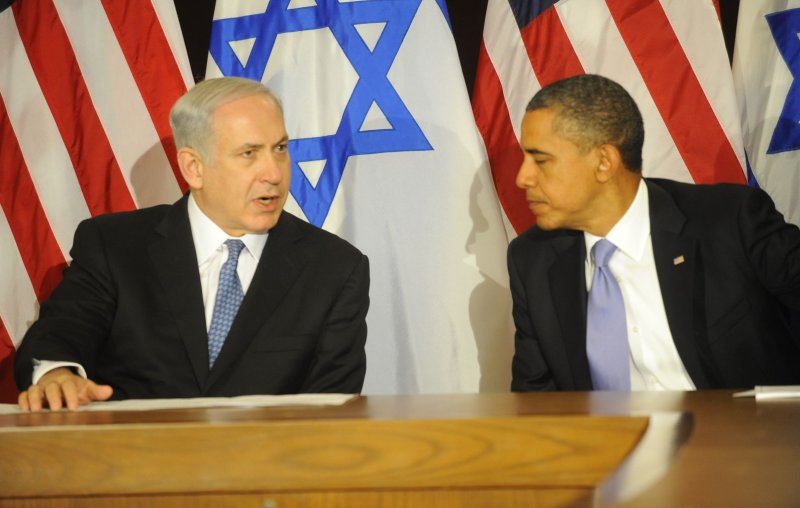United States President Barack Obama mets with Israeli Prime Minister Benjamin Netanyahu during the UN General Assembly at the UN headquarters in New York on September 21, 2011. UPI/Aaron Showalter/Pool |
License Photo
WASHINGTON, March 2 (UPI) -- Israel plans to press the White House for an explicit threat of military action against Iran if sanctions don't stop its nuclear program, diplomats said.
Prime Minister Binyamin Netanyahu, who is scheduled to meet with President Barack Obama at the White House Monday, is expected to be steadfast in his resolve to persuade Obama to take a tougher stand against Iran than the administration's current position, that it will "not take any option off the table," diplomats told the British newspaper The Guardian.
Administration sources told the newspaper Obama was unlikely to make a major shift in policy in public but might give Netanyahu firmer assurances in private.
Israel has repeatedly said it would not let Iran reach nuclear-weapons capacity and declared it had an option to launch a military strike against Iran's nuclear facilities as a last resort.
U.S. officials who have assessed the likely Iranian responses to an Israeli attack believe Iran would retaliate by launching missiles on Israel and mount terrorist-style attacks on U.S. civilian and military personnel overseas, The New York Times reported.
U.S. intelligence officials say no hard facts support the contention Iran has decided to build a nuclear bomb, even though evidence indicates Tehran is making progress toward a nuclear weapons program, the Times said.
U.S., Israeli and European officials, supported by U.N. weapons inspectors, assert Tehran plans to build nuclear weapons. Iran insists its nuclear program is for peaceful civilian uses only.
Iranian Foreign Minister Ali Akbar Salehi reiterated his nation's contention to the international Conference on Disarmament in Geneva, Switzerland, Tuesday. He said Iran considered "the production, possession, use or threat of use of nuclear weapons" to be "illegitimate, futile, harmful, dangerous and prohibited as a great sin," citing a religious decree by Iranian Supreme Leader Ayatollah Ali Khamenei.
Salehi told the conference Iran wanted negotiations on a treaty banning nuclear weapons altogether.
Salehi said in January and February -- amid tough economic sanctions adopted by the United States and Europe -- his country wants to resume talks on its nuclear program with the United States, China, Russia, France, Germany and Britain.
The talks have been stalled for more than a year, after Iran presented conditions, including the lifting of sanctions, the West considered unacceptable.
The six major powers have agreed in principle to accept Iran's offer and could announce the talks as early as Friday, The Guardian reported.
While the six powers had no high expectations of a breakthrough, they agreed every peaceful avenue should be explored in the hope of avoiding a new Middle East conflict, the newspaper said.
"Our policy is to do everything we can to prevent Iran from acquiring a nuclear weapon," White House spokesman Jay Carney told reporters Thursday.
After Washington and the European Union imposed economic sanctions against Iran, Tehran vowed to retaliate by blocking the Strait of Hormuz, preventing some 20 percent of the world's oil from being shipped.
Obama takes Iran's defiant pursuit of uranium enrichment "extremely seriously and does not take any option off the table," Carney said. "The option that he is pursuing -- because there is still time and space for the diplomatic path to produce the desired result -- is the right way to go, precisely because the best way to be sure that Iran does not acquire a nuclear weapon is for Iran to forsake its nuclear weapons ambitions. And that is the policy that we're pursuing."
Israel said Thursday it would soon conduct the first test of an advanced anti-ballistic missile system designed to intercept incoming missiles from Iran and other adversaries.















